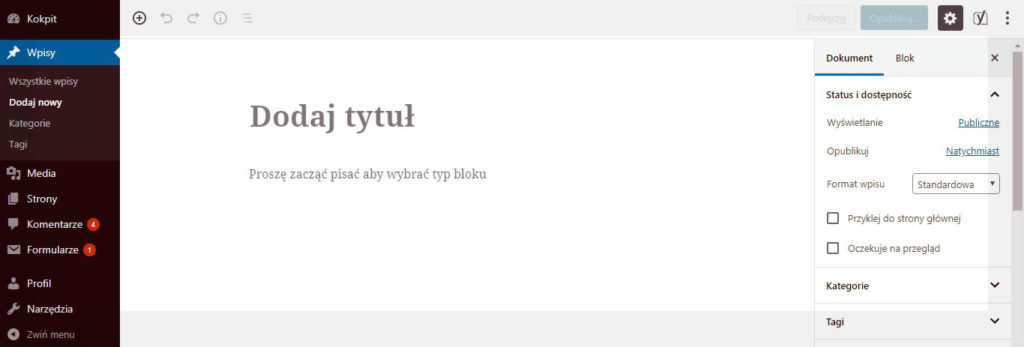Products and services have moved mainly online. The owner of a stationary store does everything to make customers feel comfortable. The same is true on the Internet—the challenge is to ensure that users who visit our website don't turn it off after just a few seconds. This is only possible if we take care of the foundation first—the CMS.
CMS stands for content management system. It helps us publish information on a website and decide how to present (visualize) it. It facilitates content management and web development without hiring a web developer.
Advantages of content management systems
Speed
Using a content management system (CMS) significantly speeds up website development thanks to a handy graphical user interface. It eliminates the need to build a site from the ground up, and we can ensure that our website is mobile-friendly.
Coding
A CMS platform is perfect for non-technical users because it allows us to set up a website without coding knowledge. All we need to do is learn the capabilities of the content management system, and the learning curve is significantly less steep than learning how to code. A content management system provides ready-to-use plugins to facilitate back-end coding.
Page builder
A content management system has a built-in page builder that enables users to create individual web pages and manage site content. This process significantly saves time and requires no coding. Often, a CMS will also offer the option to save the already created page as a template so we can easily reuse it.
Security
Since CMS platforms allow multiple users to collaborate on a site, the owner of a content management system can control permissions and manage who can access it. We can also enable two-factor authentication for users.
Search engine optimization
Search engine optimization (SEO) is crucial for attracting as much organic traffic as possible. A content management system simplifies the SEO optimization process by providing dedicated plugins.
Customization options
Most CMS platforms offer the ability to customize themes to meet our needs. We can choose from a selection of themes that will make our site look more professional and, depending on the selected theme, be mobile-friendly. Additionally, if we have some coding experience, some CMSes allow us to modify their source code; therefore, the customization options expand.
Disadvantages of content management systems
Costly plugins and widgets
CMS sites heavily rely on plugins and widgets, which can get expensive. Most of the functionalities we would like to implement will require their use; therefore, we should keep that in mind and account for it in our cost estimation.
Maintenance
Regular maintenance of content management systems is crucial if we want our website to run smoothly with as few errors as possible. The frequency of maintenance will be influenced by the amount of traffic our website attracts; the heavier it is, the more often we'll have to perform maintenance. We must monitor and update our system whenever CMS developers release updates that fix bugs and increase security levels.
Loading speed
CMS platforms provide decent page loading speed, although this speed will vary depending on the chosen CMS; the cheaper ones may be significantly slower. The overuse of plugins also affects the loading speed.
Functional requirements limitations
The bigger the project, the longer the functional requirements list, and unfortunately, a CMS platform will eventually have a problem catching up. If we're involved with a project that requires multiple processes, workflows, and stakeholders, the CMS will fall short compared to dedicated solutions.
Potential security risks
As mentioned, CMS platforms need to be continuously maintained and updated to prevent possible security breaches. The number of plugins also increases security risks, and we need to ensure they're up to date. Otherwise, we expose the website to security vulnerabilities, which include attacks such as DDOS, SQL Injections, or Cross-Site Scripting.
Scalability
CMS platforms' scalability is limited; various content management systems have different capacities to sustain users. Once your website traffic grows, you will either need to adapt the CMS, which can be challenging without coding knowledge, or look for a more dedicated solution.
It's worth mentioning that changing the web hosts of CMS platforms takes a lot of work. We'll need to transfer files to change web hosts, which can be cumbersome depending on the platform's size. The best solution is to let the new web hosts handle this task, which may involve additional costs.
Content management systems are important
Let's imagine our CMS isn't very functional or doesn't allow us to present our products or services the way we want them because we lack the necessary knowledge. We're killing our own business this way.
We only have to look at the statistics. Companies with at least three members who, through experience, understand how digital technologies affect business success are a treasure. They yield 17% higher profit margins and bring revenue growth of 38%, reports the MIT Center for Information Systems Research.
The data regarding website traffic is no less important. A few years ago, the Stanford Persuasive Tech Lab showed that 75% of users judge a company's credibility by its website's appearance. Even a long-standing presence on the market combined with numerous successes is sometimes insufficient when our site looks like it meets the standards established a decade ago.
This problem also impacts companies that offer services or products to other companies. The Stanford Persuasive Tech Lab reported that 85% of businesses check a company's website before doing business. A more recent study would undoubtedly increase this result.
Looking at the data above, we can see that digital transformation requires us to ensure we have the best possible website, with a solid CMS as its foundation. We're faced with the problem of choosing between two systems: open source and custom.

Open-source content management system
Open-source provides access to the source code—we download it and make whatever changes we want if we have programming knowledge. We create new modules through changes in the source code, each responsible for different system functionalities. Under an open-source license, the CMS gathers a large community that shares new modules, although their differences are often barely visible.
The CMS based on the GNU General Public License (GPL) has the advantage of being free. However, enjoying its benefits is difficult when we aren't familiar with programming languages, such as the popular PHP. Let's remember that a company that makes a source code available for free also hopes to make a profit, for example, by offering to sell domains.
The most highly recommended CMS is WordPress. It's the most popular free CMS for a reason —frequent updates, stability, simplicity, and a vast community make it number one. This year's calculations show that 43% of all sites were written on WordPress. When we consider only websites that use a CMS, about 60% of them are based on WordPress, and roughly 400 million Internet users visit them every month.
However, when we choose WordPress (or any other open-source CMS), we condemn ourselves to limited development, while a custom system allows for much more maneuvering.
Custom content management system
Let's focus on a custom CMS, which an external company will prepare for us. We have two licenses to select from term and perpetual. The first usually involves a monthly subscription. The second, however, means a heftier one-time fee but gives us unlimited use of the system. After purchasing the CMS, the provider won't immediately leave a customer; they often get access to free yearly updates and technical support.
But what happens after that time passes? Let's not be afraid that, suddenly, everything will fall on our shoulders. It's already a certain standard that software developers prepare newer system versions that are available for purchase. An additional plus is choosing between the whole package or only selected modules. Yet another option is to temporarily purchase access to an update, which can be found, for example, by logging on to the provider's website.
The most significant advantage of the custom CMS is that it allows users to create a system that will fulfill their desires, as it will be designed for individual needs from the beginning. However, a less "spiced up" CMS (with standard options) won't win in a clash with the constantly updated WordPress, whose system and features are continually being improved.

Summary
It's hard to say which solution will be better: an open-source or custom CMS. It all depends on our expectations. The latter best meets individual needs. On the other hand, an open-source CMS, such as WordPress, will provide continuous updates and be easy to use from the user's level, thanks to a user-friendly administration panel.
Feaures of the open-source CMS:
- The open-source CMS is based on a free license.
- It offers open-source code but requires programming knowledge to implement.
- Usually, this type of CMS involves hiring a person or company to handle site maintenance.
- This content management system provides access to numerous modules.
- It offers support on websites and discussion forums thanks to a large community.
- Open-source CMS requires constant improvements and updates.
Features of the custom CMS:
- Usually, the custom CMS offers two types of licenses: perpetual and term. The cost depends on our needs—it is determined by the number of functionalities and additional work we'll commission, such as graphic design.
- This type of content management system provides numerous functional capabilities, modular solutions, and frameworks that allow customization.
- Custom CMS offers technical support for the warranty period.
- Custom CMS providers offer paid updates or a maintenance contract when the warranty period expires.
- Using a custom CMS means fewer errors.






